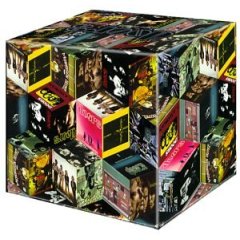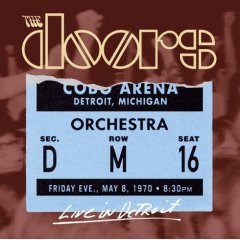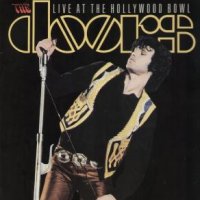
The Doors is the debut studio album by American rock band the Doors, released on January 4, 1967, by Elektra Records. It was recorded in August 1966 at Sunset Sound Recorders, in Hollywood, California, under the production of Paul A. Rothchild. The album features the extended version of the band's breakthrough single "Light My Fire" and the lengthy closer "The End" with its Oedipal spoken word section. Various publications, including BBC and Rolling Stone, have ranked The Doors as one of the greatest debut albums of all time.

Waiting for the Sun is the third studio album by the American rock band the Doors, released by Elektra Records on July 3, 1968. The album's 11 tracks were recorded between late 1967 and May 1968 mostly at TTG Studios in Los Angeles. It became the band's only number one album, topping the Billboard 200 for four weeks, while also including their second US number one single, "Hello, I Love You". The first single released off the record was "The Unknown Soldier", which peaked at number 39 on the Billboard Hot 100. It also became the band's first hit album in the UK, where it reached number 16.

Absolutely Live is the first live album by the American rock band the Doors, released on July 20, 1970, by Elektra Records. The double album features songs recorded at concerts held in 1969 and 1970 in several U.S. cities. It includes the first full release of the performance piece "Celebration of the Lizard" and several other tracks that had not previously appeared on any official Doors release. The album peaked at number eight on the Billboard 200 in September 1970.
The "Alabama Song"—also known as "Moon of Alabama", "Moon over Alabama", and "Whisky Bar"—is an English version of a song written by Bertolt Brecht and translated from German by his close collaborator Elisabeth Hauptmann in 1925 and set to music by Kurt Weill for the 1927 play Little Mahagonny. It was reused for the 1930 opera Rise and Fall of the City of Mahagonny and has been recorded by the Doors and David Bowie.

Legacy: The Absolute Best is a two-disc compilation album by American rock band the Doors. Released in 2003, it includes the uncensored versions of both "Break On Through " and "The End". Also included is a previously unreleased studio version of Morrison's epic poetry piece "Celebration of the Lizard," a rehearsal outtake from the band's Waiting for the Sun sessions.

In Concert is a live triple album by the Doors released in 1991. The songs were recorded at several concerts between 1968 and 1970 in Los Angeles, New York City, Philadelphia, Pittsburgh, Detroit, and Copenhagen. The Doors' producer, Paul A. Rothchild, remarked, "I couldn't get complete takes of a lot of songs, so sometimes I'd cut from Detroit to Philadelphia in midsong. There must be 2,000 edits on that album."
"When the Music's Over" is an epic song by the American rock band the Doors, which appears on their second album Strange Days, released in 1967. It is among the band's longer pieces, lasting 11 minutes.

Live in Boston is a triple CD live album by American rock band the Doors released in 2007. It was recorded at the Boston Arena on April 10, 1970, during the band's Roadhouse Blues Tour. The band performed two shows, one starting at 7 pm and a second scheduled for 10 but not actually starting until past midnight. Jim Morrison appears to be intoxicated during the entire latter show, and continued drinking heavily throughout the performance. The late start ended with the venue's owners cutting power to the stage to force the end of the concert.

The Complete Studio Recordings is a seven compact disc box set by American rock group the Doors, released by Elektra on November 9, 1999. It contains six of the original nine Doors albums, digitally remastered with 24 bit audio. The album includes previously unreleased tracks that had surfaced on The Doors: Box Set, on disc seven. The albums are placed in chronological order.

Essential Rarities is a compilation album by the Doors, originally released as part of the boxed set The Complete Studio Recordings in 1999, but reissued in 2000 as a single CD, containing studio cuts, live cuts and demos taken from the 1997 The Doors: Box Set.

Live in Detroit is a double CD live album by the American rock band the Doors. It was recorded at the Cobo Arena in Detroit on May 8, 1970 during the band's 1970 Roadhouse Blues Tour. It was released on October 23, 2000 on Rhino Records.

The Doors: Vinyl Box Set is the seventh box set for American rock band the Doors. It is a seven-record set of the original six studio albums, remastered in stereo from the original analogue tapes and pressed on 180-gram HQ vinyl, and a mono version of the debut album. Artwork, packaging, and inner sleeves are replicas of the original LPs issued between 1967 and 1971. The albums were remastered from 192k/24 bit digital copies and pressed at Record Technology (RTI). An insert booklet includes notes from Jac Holzman, founder of Elektra Records and Bruce Botnick the Doors' longtime sound engineer/co-producer on all the original studio albums.

Live in Pittsburgh 1970 is a live album by the American rock band the Doors. The concert was recorded at the Pittsburgh Civic Arena in Pittsburgh on May 2, 1970 and released in 2008 on Rhino Records. It is the sixth full-length live set released from the Bright Midnight Archives collection which contains a number of previously unreleased live concerts by the Doors.

Boot Yer Butt!: The Doors Bootlegs is a four-disc box set released by Rhino/Elektra Records for the band the Doors, featuring songs that were recorded as bootlegs during concerts of the Doors ranging from the years 1967 to 1970.

Live at the Matrix 1967 is a double live album by the American rock band the Doors. It was recorded at The Matrix in San Francisco on March 7 and 10, 1967 by club co-owner Peter Abram. The recording is notable as one of the earliest live recordings of the band known to exist, played to a mostly empty venue. By March 1967, the Doors had recorded only their debut album and "Light My Fire" had yet to be released as a single, and they were still relatively unknown outside Southern California.

Live at the Aquarius Theatre: The First Performance is a double live album by American rock band the Doors. It was recorded at the Aquarius Theatre in Hollywood on July 21, 1969. The album contains the band's first performance that day. The second show can be found on Live at the Aquarius Theatre: The Second Performance.

Live in New York is a six-disc box set of four complete concerts performed American rock band the Doors on January 17 and 18, 1970 at the Felt Forum in New York City. Two shows were played each night, with 8:00pm and 11:00pm scheduled start times on January 17, and 7:30pm and 10:00pm scheduled start times on January 18. The final show featured an extended encore with guests John Sebastian and Dallas Taylor (drums) that concluded around 2:30am. Select tracks were previously released on the Doors' live album In Concert and as part of The Doors: Box Set. About a third of the material was previously unreleased.

The Doors Collection is a music compilation by the American rock band the Doors, released on Laserdisc and DVD in 1995 and 1999, respectively. It compiles three films previously released by MCA/Universal Home Video: Dance on Fire (1985), Live at the Hollywood Bowl (1987) and The Soft Parade – A Retrospective (1991).

The Bright Midnight Sampler, is a compilation CD of live performances by American rock band the Doors, released September 25, 2000.

Live at the Aquarius Theater: The Second Performance is a double live album of the band the Doors, released as a double CD recorded live at the Aquarius Theatre in Hollywood on 21 July 1969. This album is one of the live performances at Aquarius Theatre by the label of the Bright Midnight Archives.


















